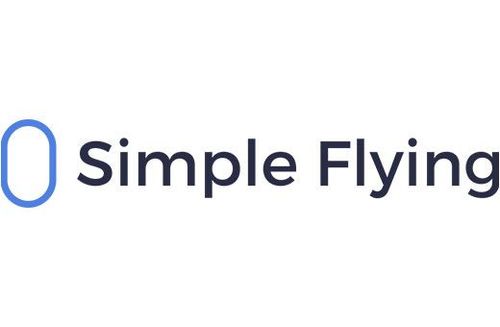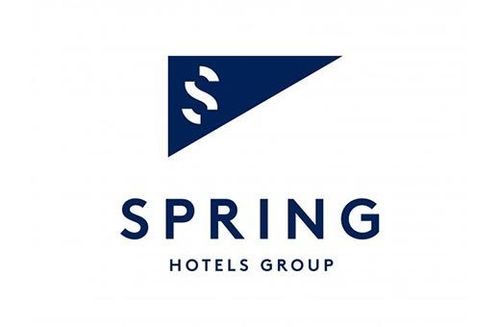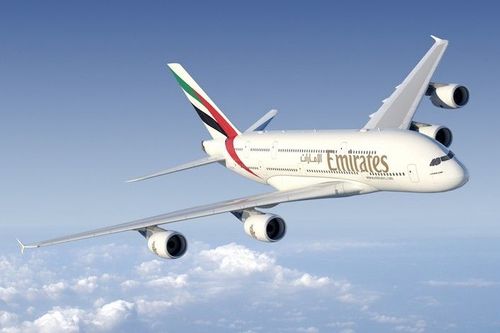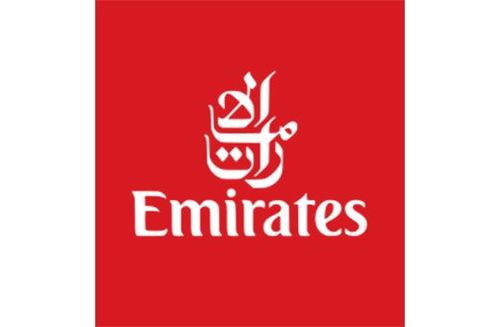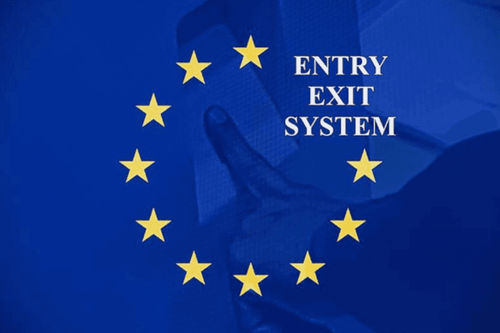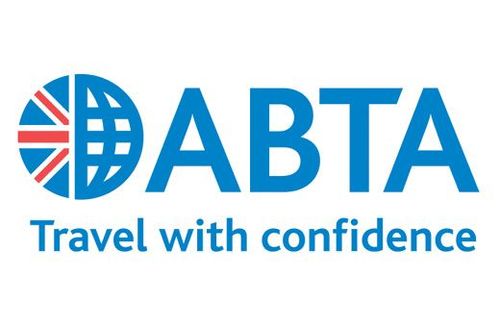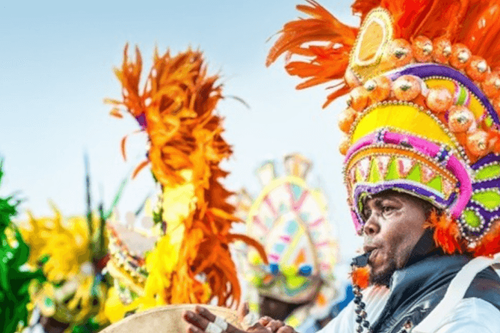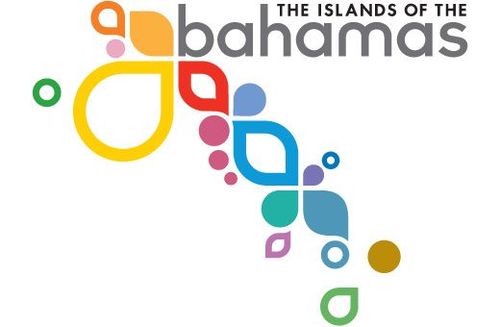Where travel agents earn, learn and save!
News / US Mask Mandate Void: How have airlines responded?
The United States' mask mandate for airlines and public transportation ends
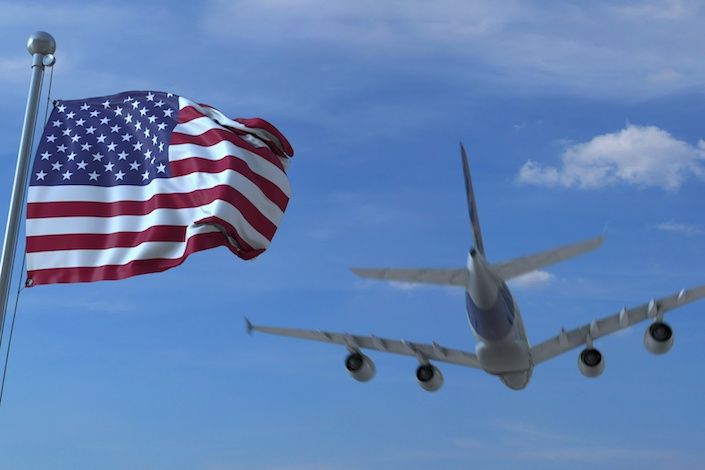
In the wake of a US federal court ruling by Judge Kathryn Kimball Mizelle that the US mask mandate on airlines and public transportation no longer holds validity. Several airlines issued statements about the mask mandate following the update.
Across the nation
Alaska Airlines' statement began with the assertion that,
"Face masks have been like boarding passes for nearly two years — you couldn’t fly without one. But, as of today, masks are optional in airports and onboard aircraft, effective immediately.
While we are glad this means many of us get to see your smiling faces, we understand some might have mixed feelings. Please remember to be kind to one another and that wearing a mask while traveling is still an option."
Other US airlines such as American, Delta, Southwest, and United are also repealing enforcement of the mask mandate. Below is a recap of each airline's statement as they come in.
American Airlines' statement:
"American Airlines has prioritized the health and safety of its team members and customers throughout the pandemic and has supported the federal government’s measures to slow the spread of COVID-19. In accordance with the Transportation Security Administration no longer enforcing the federal face mask mandate, face masks will no longer be required for our customers and team members at U.S. airports and on domestic flights.
Please note face masks may still be required based on local ordinances, or when traveling to/from certain international locations based on country requirements. In keeping with our commitment to creating a welcoming environment for everyone who travels with us, customers and team members may choose to continue to wear masks at their own discretion."
Delta's announcement:
"Following the ruling of a U.S. district court judge on Monday, April 18, the Biden Administration announced that the Transportation Security Administration (TSA) will no longer enforce the federal mandate requiring masks in all U.S. airports and onboard aircraft. Effective immediately, masks are optional for all airport employees, crew members and customers inside U.S. airports and onboard aircraft.
Delta employees and customers may continue wearing masks if they so choose. Wearing a well-fitting mask protects the wearer, even if others around them are not wearing masks."
JetBlue joined in the decision to go masks optional, but with a caveat:
"In line with Monday’s federal court ruling and the Transportation Security Administration’s guidance, mask wearing will now be optional on JetBlue. While no longer required, customers and crewmembers are welcome to continue wearing masks in our terminals and on board our aircraft.
Regardless of the U.S. rule change, customers and crewmembers who are traveling internationally should always have a mask with them in case they continue to be required at their destination."
Southwest Airlines' statement:
“Effectively immediately, Southwest Employees and Customers will be able to choose whether they would like to wear a mask, and we encourage individuals to make the best decision to support their personal wellbeing. Additionally, Southwest will continue supporting the comfort of those who travel with us by offering additional layers of protection, including sophisticated cabin air ventilation systems onboard our aircraft which incorporate HEPA air filtration that removes at least 99.97% of airborne particles.”
Here's United's tweeted announcement on mask-optional:

Airports such as Seattle-Tacoma are also going mask optional. Make sure to check before you go if masks are optional or mandatory.

Public health officials are concerned about reducing "layers of protection"
For Public Health Officer Dr. Allison Berry, MD based from Washington State's Olympic Peninsula this was not a good idea. Last week she wrote the author;
“I think extending the [mask] mandate is a good idea. Public transportation is one of the highest risk spaces for COVID-19 transmission so it is appropriate to have more layers of protection there.”
Dr. Berry, MD has been a consistent public voice in taking the fight against COVID-19 with a formal education by John Hopkins University. She has been profiled by local and national media for her courageous communications and idealism.
She was also worried about JetBlue's recent financial incentive to report in while ill writing the author saying, "I think giving out bonuses for not using sick days is not a good idea because it encourages people to come to work sick, which is the opposite of what we want to see right now."
Another public health official in Dr. Saskia Popescu - an infectious disease epidemiologist and Senior Infection Preventionist in Phoenix, Arizona - tweeted deep concern:

Furthermore, masking has been shown to work in curtailing airborne viruses. The National Library of Medicine in a paper said,
“Wearing a mask ... will effectively block the respiratory cloud, although the side leakage is possible. Some studies indicated that wearing a mask can reduce the generation of infectious aerosol during cough. The current research results have shown that COVID‐19 is mainly transmitted via droplets in the air. There is a potential risk of airborne transmission in an indoor environment with poor ventilation. The distance of droplet transmission can extend up to 4 m. ... Therefore, wearing mask in public is essential as its effectiveness has already been well established by the current studies.”
Andy Slavitt, a US national health care executive, architect of President Biden's vaccine delivery program, and author of Preventable: The Inside Story of How Leadership Failures, Politics, and Selfishness Doomed the U.S. Coronavirus Response, tweeted up quite an assessment. In part, Slavitt said about US airlines:

For some perspective, some passengers who found out mid-flight were scared for their loved ones who are vulnerable to COVID-19. Here's just one example of many from Twitter:

Something to consider.
Now what about banned passengers?
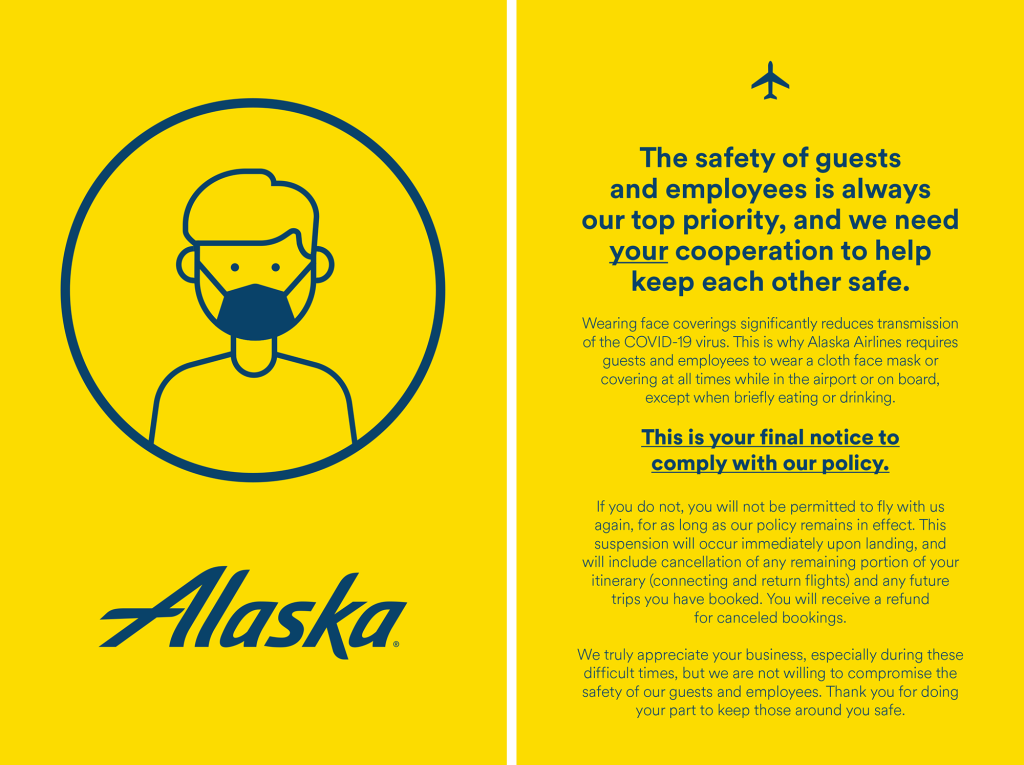
The Alaska Airlines yellow card warning passengers of the consequences of noncomplaince with the mask policy.
Infographic: Alaska Airlines
This is a big ongoing question. According to Alaska Airlines' aforementioned statement, "We will have some guests whose behavior was particularly egregious who will remain banned, even after the mask policy is rescinded." It is likely that decisions on unbanning passengers who were banned during the mask mandate will be made on a case-by-case basis, airline by airline.
Flight Attendants speak
The Association of Flight Attendants, representing most of the nation's flight attendants who take care of passengers, has issued a statement posted below.

For the Alaska flight attendants' union, there was also some concern that the announcement would come to passengers before crews. The Association of Flight Attendants (AFA) reached out to Bloomberg in February issuing an e-mailed statement saying:
“We have every expectation that the mask mandate will be extended for the near term. The conditions in aviation are the same. Our youngest passengers do not yet have access to the vaccine.”
The British experience without a mask mandate
Sadly the Brits have found that their relief from a mask mandate has led to loss of crew availability due to illness. Sadly, easyJet has had to plan for up to 20% of crew calling in sick to the point of losing 6% of flight capacity. Perhaps more flight cancellations due to lack of crewing are in the United States' future.



